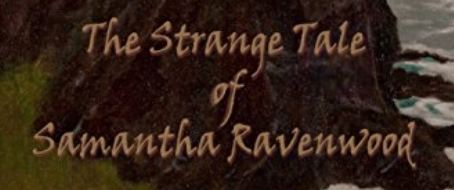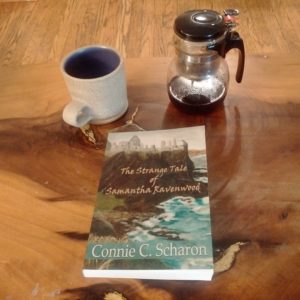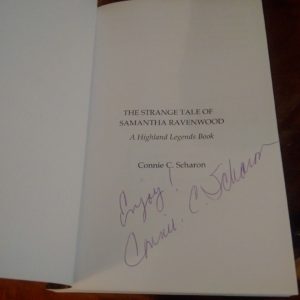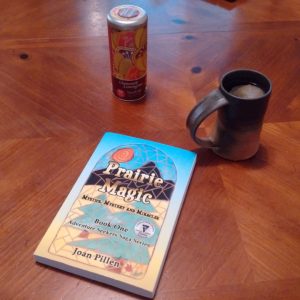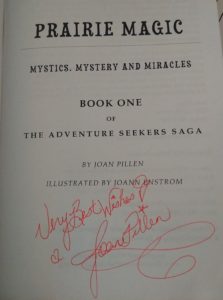I won a signed copy of Prairie Magic, by Joan Pillen, through Goodreads.
Description from Goodreads:
New Age in the Old West
Tokada Good Elk, world-famous author and horseman, stood still in the middle of a desolate South Dakota highway. Desperate for guidance, he stretched one hand up to Great Spirit while his other arm cradled the lone survivor of the atrocious crash–a frightened puppy he had rescued from the stranger’s car. The only other article left unscathed was a beeping radar detector grimly warning that time was running out. In order to keep his promise and protect “the secret,” he would need to disappear in a matter of seconds. True to his pledge, the octogenarian hid a clandestine item in his vest. What will the future hold for him and his loved ones? Would dreams die on the highway with the rest of the family?
Book One of the Adventure Seekers Saga, Prairie Magic is exciting, entertaining, and enlightening…the perfect mix of warm humor and ancient wisdom!
Review:
Man, I tried so hard to like this book. After winning it, the author commented on another of my reviews and seems really nice. I know she’ll see this one when I post it and I apologize for my honesty, but I just couldn’t like this. I like the idea and the intention, but the book left me cold. In fact, I took notes. And there is no reason anyone should know that I only take notes in very limited circumstances, the most common one being when a book annoys the day lights out of me. The note taking is a cathartic activity. Like when something out of the ordinary happens in your day and you just have to tell someone. That’s when I take notes. The end result is that books I take notes for almost always have longer reviews and very rarely good ones. Though I try to curb it, such reviews are also the ones I’m most likely to let the snark fly in because, again, I’m often venting.
I say all that as a warning about what’s to come. Because this really isn’t a bad book. It just stepped on my toes. I think of it very much like I do a lot of Christian Fiction. If it supports your current beliefs and worldview (in this case pan New Ageism), you will probably really enjoy it. If not, it’s not going to convert you, because it’s smug sense of superiority and self-importance is so incredibly off-putting.
The Hanson and Elk families are made out to be so unbelievably perfect they are completely un-relatable. While their enemies are largely just people who are world-weary and bitter. Honestly, if I had to live next to someone as insufferable as Hope is described to be I might turn wicked too. And while I understand the point of making the family so very, very perfect (I really wish I’d read it on Kindle so I could search out how many times that word was used) was to make their ease and happiness appear enviable in the hope that it might inspire others to follow their path, instead I found it felt very judgmental. No one can live up to that standard. We’re all the Rogers in this story and it’s insulting.
Plus, I just found the relentless perfect people, with their perfect world views, and perfect manners, and perfect appearance, and perfect homes, and perfect love, and perfect children, and perfect horses, and perfect barns, and perfect businesses, and perfect automobiles (really, even they were described as especially nice), and perfect friends, and perfect homeschooling, and perfect understanding of nature, and perfect shopping abilities, and perfect decorating sense, and perfect meals, and perfect communication, and perfect…you get the point, painful; especially the rather lengthy chapter(s) in which they were actively compared to the not perfect people.
The two competing sides of the equation in this book, representing how to live, are really extreme. On one side you have the Disney version, where birds all but alight on the characters’ shoulders, the earth is respected, there is perfect love and flowers bloom from each footprint. Ok, that stuff doesn’t happen, but only because this is most contemporary and not fantasy (except where the mysticism slips so far it reads as fantasy.) On the other, we have a group of people trying to counter the innocent, do-gooders for no reason but that they are bad. They want to stop the nice wholesome project to build strip clubs and other such seedy joints instead. They do evil, are ugly, have no skills (even ones they would have needed their whole lives up to that point), they are shown to be especially and pointlessly cruel, not good business people, have failed relationships; mistreat their animals, etc. The contrast was far too extreme.
There’s also a subtle, but pervasive judgementalism to it all. For example, when talking about a woman who runs the ‘Sassy Cowgirl Collection’ booth, this is said, “If only she hadn’t felt the need to live up to sassy when humble, clever or sweet would have served her much better.” Really, so we all need to be Mary Sues? Because what the hell is wrong with being sassy? Or sexy or slutty even? This book makes me feel that if you’re not wearing pearls and a pastel cardigan (or the New Age equivalent) there must be something subpar about you. In fact, all women except the main characters are described as ‘floozies,’ ‘immature, insecure, woman-child,’ ‘Rodeo queen,’ ‘prom queen,’ and ‘immature, hot mess,’ etc. All slightly demeaning in tone.
This is one of those books with good intentions, that fails utterly for me. The last paragraph of the blurb says the book is supposed to be “exciting, entertaining, and enlightening.” I think it tries far too hard to be enlightening and is thus unable to also be exciting and entertaining.
The book had a very obvious and odious intention of educating the reader about New Age Mysticism. I say odious because it was distracting to the plot and the lessons eclipsed the story several times, for most of the book maybe even. The reader is several times subjected to lengthy descriptions of practices intended to educate them on the uses of particular essential oils or expound on the benefits of crystal or sound treatments or juicing. A brief example (which is actually hard to come by, as most are quite long, like seven step spa treatments, every step having multiple parts and all being extensively explained): “Leif, thank you for the wonderful breakfast! My goodness—scrambled eggs, Belgian waffles and fresh apple-pineapple juice with vitamin C and other nutrients for proper cholesterol levels and excellent cardiovascular health. Delicious and good for us!” Who talks like that? But more importantly, it disrupted the scene, distracted from the dialogue (because it doesn’t sound natural) and took me out of the story.
Eventually, I just started skimming it all. For example, at one point, on page 259, I literally read a section like this, “The four fixed signs of the zodiac—Taurus, bla, bla, bla…symbolic of the four bla, bla, bla, the four bla, bla, bla, the four bla, bla, bla, the four bla, bla, bla and the four corners of the bla, bla, bla.” There were really that many lists of four, but I literally no longer even cared enough to see what was actually listed. I really just said bla, bla, bla in my head and skipped to the period. Especially since some of these mystical lessons were truly shoehorned in. Like a random fan coming up and saying, “Hope, tell me about the World card,” (tarot cards) totally outside of whatever else is happening in the story. (Though I suspect they are supposed to be angels or some such.)
The writing is ok. Though, I had a few complaints. It depends heavily on clichés for characterization. There is too much description. No one can just get in their truck. It has to be a nice, four-door pickup truck. Similarly, there is too much tell, not enough show and names are mentioned too often in dialogue. This means the story is difficult to invest in and the dialogue doesn’t sound natural at times. Lastly, there are so many lists. (This obviously soaked into my psyche because I notice a ton of lists in this review too.) Often times when describing things the author does it with lists. Here’s an example. “Hope’s store, How the West is One, fused Norwegian, Native American and western style clothing and gifts. Employing her deal making skills, relentless shopping tactics and refurbishing abilities, Hope sold treasures at affordable prices.” And while that might not seem too bad on its own, 50 such passages in a row got tedious. It kept the flow of the book always a little off. In fact, the last 25 or so pages of the book is basically just a list of shops and their descriptions, as a newly introduced character goes in and out of each one.
On the positive side, I really do think this author has good intentions. And the theme of learning to live a positive, balanced life is a good one (even if it’s imparted with the delicacy of a sledge hammer). People who are into New Age spiritualism and enjoy reading about it might not feel so much of its inclusion was detrimental to the story. And there is some genuine humor in here. I laughed out loud several times. So, while this book pushed me to the point of ranting, and I really could go on, I think it’s more matter of this being a poor fit for me rather than it being a bad book.
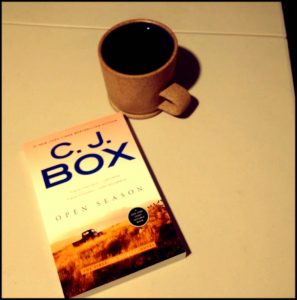 I won a copy of Open Season, by C. J. Box through Goodreads. You guys, I’ve been so lucky in the winning department lately!
I won a copy of Open Season, by C. J. Box through Goodreads. You guys, I’ve been so lucky in the winning department lately!
